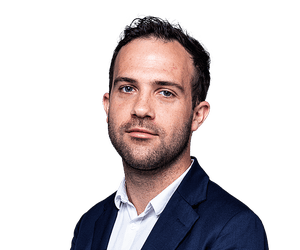
Anthony Albanese holds press conference
Anthony Albanese is speaking in Melbourne at the Walter and Eliza Hall Institute, where anti-viral medications are made. He says the pandemic has helped to illuminate the impact of science.
If there is anything that has come out of this dreadful pandemic, that at least is a bit of a positive, it’s that there is now such a broad recognition across Australian society that science isn’t something that’s abstract, that produces books and produces papers – it’s something that makes a difference to people’s lives. It literally, as a result of collaborative research, including research done right here in Australia, including at this institute.
Key events:

Michael McGowan
Barilaro rejects former chief of staff’s claims as “fictitious” and “false”
Former New South Wales deputy premier John Barilaro has put out a statement rejecting the explosive submission from his former chief of staff Mark Connell as “fictitious” and “false”.
As we’ve reported, this morning the upper house inquiry into Barilaro’s appointment to a lucrative New York Trade job released bombshell evidence from Connell regarding a conversation between the two that he alleges took place in April 2019.
Connell said the former deputy premier told him: “this is it; this is the job for when I get the fuck out of this place” prior to the jobs being publicly announced.
But Barilaro has wholly dismissed the evidence, as well as insisting the inquiry should call him as a witness. He said in a statement:
The conversation he has recalled is fictitious, false and only serves as a reminder as to why we had to part ways.
If this inquiry is genuine in its intent to understand the process and the truth by which I was appointed, then surely I would be called up to provide this detail immediately.
The continued drip feed of select information from the inquiry into the public domain goes against all procedural fairness.”
Working from home should not be a decision employers take unilaterally, health minister says
The health minister, Mark Butler, has taken to the mic at that press conference in Melbourne.
Butler is asked what employees should do in a situation where they are able to do their jobs from home but their employers are expressing a preference for them to come into work.
The chief medical officer Paul Kelly yesterday released a statement encouraging employers to consider whether working from home arrangements could be put in place over the course of the next weeks over this third Omicron wave.
Butler said:
Our view… is reflected in Professor Kelly’s statements that’s really a case-by-case basis. Employers should be engaging with their employees. They should – in good practice this should not be a decision employers take unilaterally. They should be engaging with their employees, that is the best approach to work health and safety and together coming to a view about the extent to which working from home arrangements on a very temporary basis could be put in place.
Albanese says more than 500,000 people had fourth jab in past week.
The prime mister provided figures on the uptake of antivirals and booster jabs:
As a direct result of the decisions that were made and announced over the past week to make antivirals more available to allow for telehealth consultations to go for longer so that people can get those antivirals prescribed. Some 30,000 additional people have had access to antivirals, bringing that number up to 116,000.
Just as people are out there getting their booster shots in record numbers. More than 500,000 in the last week have had their fourth shot.
‘Get your booster … stay at home if you’re sick’: Albanese on Covid
Albanese says there are four key ways to make a difference … with the spike in Covid cases Australia is going through:
Get your booster.
Get access to antivirals if you’re eligible.
Wear a mask if it’s appropriate.
And stay-at-home if you are sick.
Albanese says health and economy intertwined in Covid response
Albanese is saying health and economic outcomes are intertwined when it comes to the pandemic response, and it is not a choice between the two. He says the vaccine and antiviral medications are “making a real difference, literally saving lives, but also saving economies as well”.
We know that early on in the outbreak, there was a bit of a debate about whether it was health or the economy. And the truth is, unless you get the health outcomes right, unless you get the science outcomes right, the economic impact would have always been more severe.
The lesson of the pandemic very early on was that you needed to improve health outcomes or else you would not have a choice but to see economic costs imposed as a direct result of the pandemic. Livelihoods lost as well as, of course, lives lost. The work that’s being done here is incredibly important. Anti-viral medicines like the ones being made here at WEHI can alleviate the symptoms when people have the virus.
Anthony Albanese holds press conference
Anthony Albanese is speaking in Melbourne at the Walter and Eliza Hall Institute, where anti-viral medications are made. He says the pandemic has helped to illuminate the impact of science.
If there is anything that has come out of this dreadful pandemic, that at least is a bit of a positive, it’s that there is now such a broad recognition across Australian society that science isn’t something that’s abstract, that produces books and produces papers – it’s something that makes a difference to people’s lives. It literally, as a result of collaborative research, including research done right here in Australia, including at this institute.
Victoria reports 28 Covid deaths and 906 people in hospital
There were 12,984 new cases in the last reporting period, and 45 people are in intensive care.

Amy Remeikis
RBA governor welcomes review
On the RBA review Jim Chalmers outlined today (and Sarah Martin told you about earlier this morning) Phil Lowe says he welcomes the “health check” and thinks it may be quite helpful:
It’s entirely appropriate for the government to take stock ofAustralia’s monetary policy framework, something we welcome. Other central banks have periodically reviewed their frameworks. We have done it internally, continuously, but I think it’s useful in the public domain as well. We very much welcome it.

Adeshola Ore
Not enough proof for prosecution, Victorian watchdog says
More from the press conference with the Victorian ombudsman Deborah Glass and the head of the state’s corruption watchdog Robert Redlich in Melbourne about their investigation into allegations of the misuse of public funds and branch stacking in the Victorian Labor party.
The investigation found two former Andrews government ministers breached parliamentary codes of conduct when they misused public funds to fuel a vast branch-stacking operation, but there was not enough proof they had committed criminal offences to recommend prosecution.
Redlich said it was not uncommon for anti-corruption agencies to find no criminal offences could be uncovered but to reveal institutional failings:
I’m not particularly troubled by the conclusion that we’ve reached in relation to the two former ministers … that we cannot recommend to the director of public prosecutions for a trial to take place.
You can read that full statement from John Barilaro’s former chief of staff here:
Here’s the full bombshell statement from John Barilaro’s former chief of staff, Mark Connell, to the inquiry into the former deputy premier’s appointment to a New York trade role. pic.twitter.com/7zFvXK4Tpa
— Josephine Tovey (@Jo_Tovey) July 20, 2022


